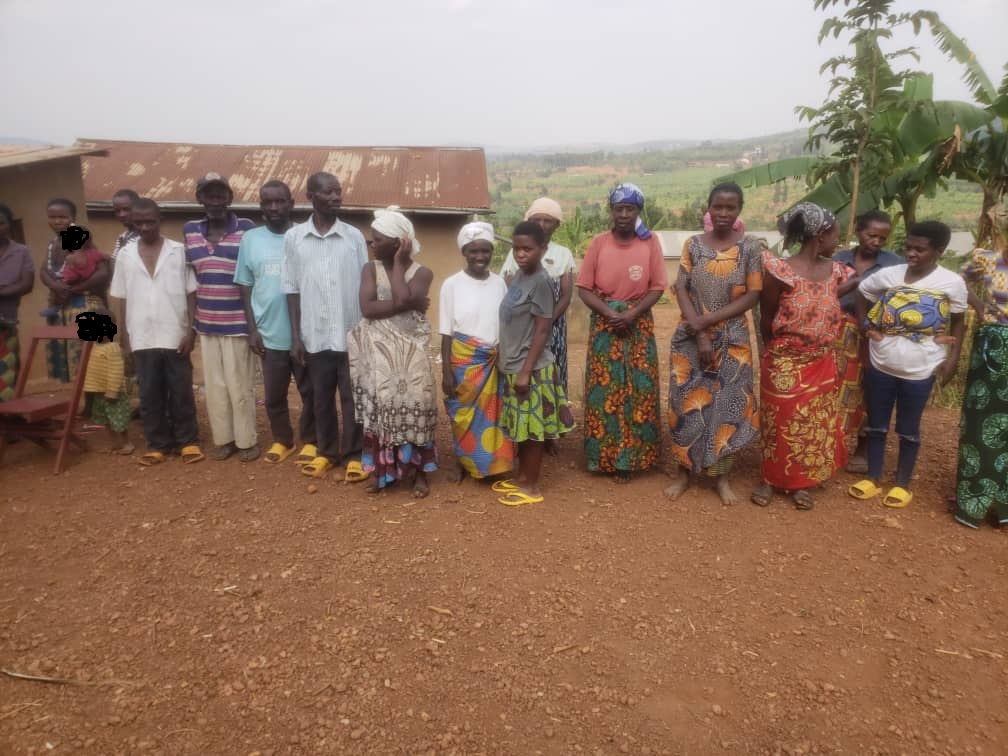Authored by Pauline Ikundabayo & Bernard Kwizera and edited by Jean Felix Muhire
In late August 2024, ICK News visited a community of historically marginalized people living in the Gakurazo Village, Musenyi Cell, Musenyi Sector, Bugesera District. During the visit, the residents shared both their gratitude for the support they have received from the Rwandan government and their aspirations for further development.
Gratitude for Government Support
The community expressed heartfelt appreciation for the various forms of assistance provided by the government, which has helped improve their living conditions. Key areas they highlighted include:
Housing and Land Allocation: The government provided them with land for settlement and built houses for their families.

Healthcare Assistance: The government has also supported their health needs by paying for their health insurance through the national community-based health insurance scheme, commonly known as “Mutuelle de Santé.”
Social Welfare Programs: Some members of the community benefit from the Vision Umurenge Program (VUP), which is designed to support vulnerable populations, including the elderly.
Their Wishes
Despite the support received, the community emphasized that there are still unmet needs that would further enhance their ability to thrive and fully participate in Rwanda’s development agenda. Among their main requests are:
Land for Farming: Many in the community, such as Liberatha Mukamutwa, explained that their traditional pottery-making skills are no longer sufficient to sustain their livelihoods. The scarcity of clay and the difficulty in finding firewood to burn the pottery pieces have made the practice less viable. As a result, they believe that receiving land for farming would enable them to provide for their families.
“It’s difficult to find clay nowadays, and even when we do, getting firewood to burn the pots is a challenge. Moreover, fewer people are buying pottery, which makes it hard to sustain ourselves,” Mukamutwa explained.
Another resident, Beatha Mukarusagara, echoed similar sentiments, noting that if they were provided with farmland, they would gladly abandon pottery, as it is no longer a sufficient means of supporting their households.
In response to their plea, the Bugesera District authorities expressed their willingness to collaborate with the Musenyi Sector to find a solution. Jean Marie Vianney Murenzi, the Director of Social Affairs Unit for Bugesera District, stated, “Although securing land is not easy, we are ready to support those showing a desire to shift from pottery to farming. Farming can help them become self-sufficient, and it’s important for them to embrace this transition.”
Similarly, Gaspard Gasirabo, the Executive Secretary of the Musenyi Sector, reiterated that while land acquisition is a challenge, efforts will be made to provide farmland to those genuinely interested in farming.
He added, “We are encouraged by the fact that they are considering alternative livelihoods. If farming is what they want, we can look for unused land or work with investors who have land to lend for cultivation.”
Land Ownership Documents: Another issue raised by the community is the lack of official land ownership documents. Although they have lived on the land for more than 15 years, many residents still do not possess formal documentation that proves their ownership. This has hindered them from applying for loans or improving their homes.

The absence of land titles also poses a challenge for younger generations, who cannot inherit or build on the land.
Mr. Gasirabo responded to these concerns, explaining that individuals who have lived on government-allocated land for five years and have maintained it properly are entitled to request land ownership documents.
“This is their right, and we will ensure that they receive the necessary papers,” he confirmed.
Registration of Children Without Known Fathers: Some community members, such as Emmanuel Rutangambwa, highlighted the difficulties they face in registering children born to single mothers, particularly when the father’s identity is unknown.
Rutangambwa shared the story of his 12-year-old grandson, who remains unregistered because his mother does not know the child’s father.

“We often have children who are born without the father being known, and the child is left with a relative or grandparent. When you try to register the child, they ask for the father’s name. The government should make it easier for us to register these children so that they can have proper identification,” he said.
However, Mr. Gasirabo clarified that Rwandan law does not require a father’s name for a child to be registered.
“It seems there is a misunderstanding. A child can be registered in the civil registry even without a known father. The only time additional documentation might be required is for vaccination records or other administrative purposes, but these are solvable issues,” he explained.
He encouraged the community to attend public meetings where such information is shared to avoid further misunderstandings.
Reinstatement on the Health Insurance List: Several community members mentioned that some of them have been removed from the list of those who receive government-paid health insurance, even though they cannot afford to pay for the service themselves.
They are requesting to be re-added to the list to continue benefiting from the health insurance coverage.
Addressing this concern, Mr. Gasirabo explained that the allocation of health insurance is based on specific criteria, focusing on the most vulnerable groups, such as the elderly, those with severe health conditions, and orphaned children.
He promised to review the cases of those who believe they have been unfairly removed from the list and take appropriate action where necessary.
“The government provides health insurance for the most vulnerable. However, for those who may not meet the criteria, there are always opportunities to support them in finding ways to become self-reliant and independent,” Gasirabo added.
The Gakurazo Village, home to 22 families of historically marginalized people, remains a community that is both grateful for the progress made and hopeful for further inclusion in Rwanda’s development.





















